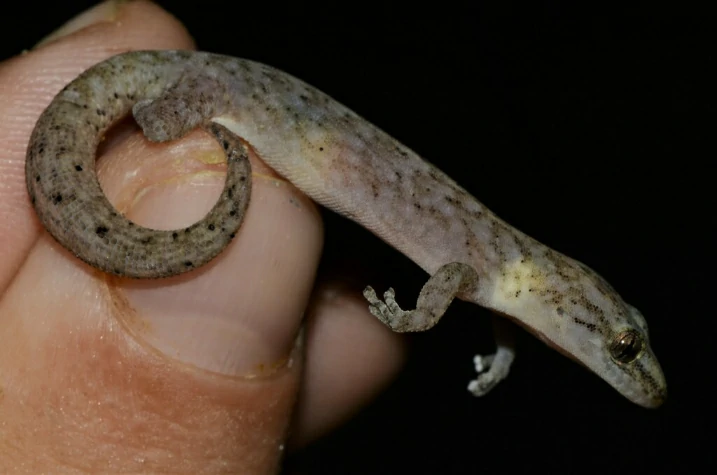If you’ve ever seen a gecko dart across a wall or hide near a plant pot, you might wonder what would happen if it fell into water.
They’re quick on land and climb like pros, but could they really survive being stuck in water?
Geckos can survive in water for a short time, but they aren’t built for swimming or living in it. They can float, paddle a bit, and even glide across the surface sometimes, but staying too long can tire them out or even drown them.
How Geckos Move on Land
On land, geckos are fast, light, and agile. Their tiny toes are covered with millions of microscopic hairs called setae. These hairs help them stick to almost any surface.
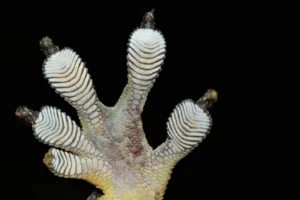
That’s why you see them climbing walls, glass, and even hanging upside down without falling. They grip, push, and balance with strong leg muscles that work best in air, not water.
Once a gecko ends up in water, all of that changes.
What Happens When a Gecko Falls Into Water?
When a gecko falls into water, instinct kicks in, it starts to paddle.
Its legs move fast and wide, like on land, but they push against water instead of solid ground. Many small geckos can float for a few minutes.
Their light bodies and natural skin oils help keep them from sinking right away.
But geckos can’t breathe underwater. Their energy drops fast, and panic sets in. Most geckos try to reach the nearest dry surface or floating object immediately.
Can Geckos Swim?
Not like fish or frogs.
Geckos can make swimming motions and move forward, but they aren’t true swimmers.
Their bodies aren’t shaped to cut through water, and they don’t have webbed feet or tails for paddling.
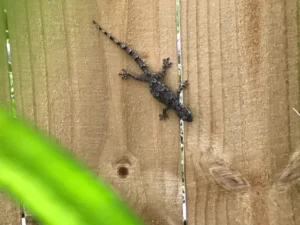
When a gecko swims, it looks more like a frantic scurry than a smooth glide.
Some tropical geckos, like Tokay or house geckos, can handle short swims, like crossing a puddle or wet leaf during heavy rain.
But it’s always brief. Once they reach dry land, they stop immediately.
Why Geckos Float But Can’t Live in Water
Geckos float because of their light bodies and slightly water-repellent skin. Trapped air gives them a little lift, keeping them on the surface for a short time.
But they can’t float forever. The air escapes, their bodies start to sink, and they eventually go under; like a leaf in a pond that gets soaked.
Do Any Geckos Live Near Water?
Some do, but “near” is the key word.
Species like mourning geckos or Indo-Pacific house geckos live close to the coast or wet environments. They enjoy high humidity, rainforests, mangroves, or seaside cliffs.
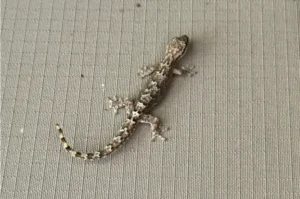
They like the moisture because it keeps their skin healthy and helps with shedding. But they always stick to dry surfaces like trees, rocks, and walls.
Even during heavy rain, they climb higher or take shelter until it passes.
How Long Can a Gecko Survive in Water?
It depends on a few things:
-
Size: Smaller geckos float better but tire faster.
-
Temperature: Warm water keeps them active longer; cold water slows them down.
-
Depth and movement: Still water makes escape easier; flowing or deep water is harder.
Most geckos survive a few minutes up to 30 minutes. After that, they risk exhaustion, water in their lungs, or drowning.
How Geckos Breathe and Why It Matters
Geckos breathe with lungs, just like us. They can’t take in oxygen through their skin.
When their heads go underwater, they hold their breath as long as they can, but it doesn’t last.
Unlike turtles, they have no special adaptations to stay underwater for long. The moment their heads are submerged, time starts ticking.
What About Geckos That Run on Water?
Some geckos, like Asian house geckos, can actually run across water for short distances.
They slap their feet fast enough to create tiny air pockets, almost like water striders. It’s a mix of speed and skill. Too slow, and they sink; too fast, and they lose control.
It’s not swimming, it’s more like skipping across the surface for a few seconds before climbing onto something solid again.
It helps them escape predators or cross small puddles.
What Happens If a Pet Gecko Falls Into Its Water Bowl?
Most pet water bowls are shallow, so geckos can climb out easily.
Still, make sure the edges aren’t too steep or slippery. If the bowl is deep, add a small rock or stick for climbing.
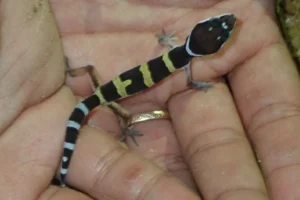
A trapped gecko can tire quickly and could accidentally inhale water if it panics.
Short dips are usually harmless, but it’s best not to let your gecko swim for its life.
Why Living in Water Would Be Dangerous
Even though geckos can handle brief water, living in it would be dangerous:
-
Breathing: They can’t breathe underwater.
-
Skin: Long exposure can soften or damage their skin.
-
Temperature: Water cools them fast, and as cold-blooded animals, they slow down.
-
Predators: In water, they’re easy targets for fish, frogs, and insects.
Short splashes are fine, but anything more is risky.
What To Do If You Find a Gecko in Water
If you see a gecko struggling in water, you can help:
-
Lift it gently with a dry towel or soft cloth.
-
Place it on a warm, dry surface.
-
Let it rest somewhere quiet to recover.
Don’t force-feed or move it too much. If it’s weak, tilt it gently so any water in the mouth drains out. Most geckos recover quickly once dry and warm.
How Some Geckos Handle Rain and Wet Environments
Geckos don’t hate rain. In tropical areas, they’re used to heavy showers.
When it rains, they move higher on walls or branches to stay damp but not submerged. They might even lick raindrops off leaves or their skin.
They don’t live in water, but they know how to live around it.
Can Baby Geckos Survive in Water?
Baby geckos are tiny and fragile. They float easily but tire fast.
If they fall into a puddle, they must find a way out quickly. Without help, they can drown in minutes.
That’s why they usually stay in dry areas (under leaves, bark, or inside cracks) where they’re safe from water.
Frequently Asked Questions
Can geckos survive on water? No, geckos can’t survive on water. They aren’t built to float or rest on it like some insects or frogs. Their toes are great for climbing, but can’t spread their weight enough to keep them up. If a gecko falls into water, it can swim a short while but must find land quickly. Staying too long would tire it out and could lead to drowning.
Conclusion
So, can geckos survive in water?
Yes, but only for a short time.
They can float, paddle, and dash across the surface for a few seconds, but they aren’t real swimmers or water animals.
Their light bodies and clever toes help them escape short encounters, but they rely on dry land for safety, warmth, and breathing.
Geckos belong to walls, trees, and stones, not ponds and streams. Water is something they drink from or avoid, not something to live in.
Hi, my name is Ezra Mushala, i have been interested animals all my life. I am the main author and editor here at snakeinformer.com.

